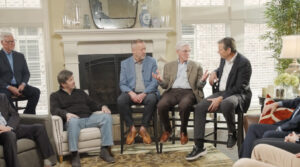God Owns It All
Transforming the Client-Advisor Relationship
by RBI Staff Writer
Introduction
Few principles have the power to fundamentally transform a financial advisor’s practice like Ron Blue’s foundational teaching that “God owns it all.” For Christian financial advisors seeking to integrate their faith with their professional calling, this simple yet profound truth creates a paradigm shift—moving conversations from mere percentages and dollar amounts to questions of stewardship, purpose, and kingdom impact. As we’ll see through the experiences of three Christian financial advisors, embracing this principle doesn’t just change client conversations; it revolutionizes how advisors approach their own financial journeys and professional missions.
Shifting from Guilt to Freedom
For many Christians, financial decisions—particularly around giving—come with an undercurrent of guilt. Al Rich, who was baptized with his daughter in 2014, describes his early experience: “For most of my Christian life… I brought a level of guilt when it came to giving to the church and also with managing my finances correctly.”
This changed dramatically when Al encountered Ron Blue’s teaching. “When I finally found Kingdom Advisors and on the first day watching Ron Blue’s video and he said, ‘God owns it all,’ it was a way different way of looking at it,” Al explains. “I wasn’t looking at it as a percentage or a dollar amount that I should be giving. It was more of ‘it’s already His, now what can I use and how can I use it correctly, and how much is enough for me to live on and still be able to give?'”
This perspective shift created immediate freedom. Al discovered he had greater capacity for generosity than he’d realized when trying to meet an arbitrary standard of giving.
Finding the Financial Finish Line
Neal Norton found that the “God owns it all” principle connects directly to contentment and the concept of a financial finish line. In client meetings, he now challenges those who are financially secure to consider their true needs.
“We had some conversations last week,” Neal shares, “and on our system, if you’re 90 to 99% likely to never run out of money, quite frankly we’re hoarding money at some point… You’re not taking this with you. We’re at the fun part. Let’s dream big. How can we expand the kingdom?”
By introducing the concept of a financial finish line—determining “how much is enough”—Neal helps clients find freedom to be more generous. “Let’s move this needle back to 80, 85% likelihood and let’s start thinking about how do we want to move this to the next generation or charities.”
The result? “You could see them almost be a little liberated,” Neal observes. “I came in and I had security knowing I was doing too well, and you took that off the table. I can do more and have a more meaningful last chapter in my life and still be okay.”
Transforming Client Conversations
Introducing biblical financial principles creates breakthrough moments for clients. Al recalls a powerful conversation with a client who had abundant resources but maintained a scarcity mindset.
“I brought [biblical principles] into the financial planning process, not even knowing where her faith lies,” Al explains. “I said, ‘I’m a Christian and God says that giving is a gift for the giver. So have you thought about what you might want to do with this money to bless other people?'”
The client’s response revealed the transformative power of this approach: “She sat there, stared at me. ‘I never once thought about giving this away at all.’ She has no children, no family to pass it on to, and it never entered her mind. And that was a very powerful moment.”
Deepening Personal Faith Journeys
The advisors’ testimonies reveal that integrating faith and finance isn’t just beneficial for clients—it deepens the advisors’ own spiritual journeys.
John Kochel notes that connecting financial expertise with biblical wisdom “deepens my faith and that’s very important to me. So not only helping others, but also helping myself and adhere to the principles.”
Neal echoes this sentiment: “The CKA [Certified Kingdom Advisor designation] is one of the best Bible studies I’ve ever had and I understand generosity much better and contentment.”
The principles have led Neal to important personal decisions: “This has helped me really sit down with my wife and say, ‘Where’s our finish line?’ We can keep moving upwards in income level, but that doesn’t mean that’s what we’re going to spend. That needs to go somewhere else.”
A Vision for the Future
These advisors share Ron Blue’s vision for churches becoming centers of financial wisdom in their communities. They believe biblical financial principles could help revitalize church engagement and deepen faith.
“I think the church is so important to all of us,” John reflects. “Perhaps some of the things that we can bring to the church might attract others to come, and perhaps that’ll deepen their faith and more people will come to Christ.”
Neal adds: “I love Ron’s vision of the church being the center of financial wisdom in the community… Ron’s vision could really help churches flourish not over the money it’s bringing in, but out of how generous the people become, which makes the kingdom grow.”
Conclusion
The simple yet profound truth that “God owns it all” continues to transform financial advisors and their clients. As these advisors demonstrate, this principle liberates people from guilt, scarcity, and fear—replacing these with freedom, contentment, and purposeful generosity. By integrating this biblical understanding of stewardship into their practices, Christian financial advisors aren’t just helping clients manage money more effectively; they’re helping them align their financial decisions with eternal values and experience the joy that comes from faithful stewardship.
As Al beautifully expressed his gratitude to Ron Blue: “Thank you for listening to God as he spoke to you… Without the system that you created, you would have a lot of people driven by faith, but reinventing a wheel and maybe trying to figure out how to do what you’ve already established for us to do.”





